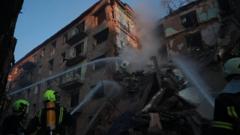As tensions rise, Israel has intensified its military operations against Iran, launching strikes targeting military sites and prisons in Tehran, amid warnings of potential Iranian retaliation against U.S. forces in Qatar. Meanwhile, diplomatic efforts for de-escalation appear tenuous following U.S. airstrikes on Iranian nuclear facilities.
Heightened Tensions: Israel's Airstrikes on Iran Intensify Amid U.S. Warnings

Heightened Tensions: Israel's Airstrikes on Iran Intensify Amid U.S. Warnings
With U.S. officials confirming potential Iranian retaliation, the conflict escalates as Israel targets key sites in Tehran and warns of continued strikes.
In the midst of escalating tensions in the Middle East, Israeli forces have ramped up their military operations against Iran, reportedly targeting critical infrastructures in Tehran. Recent reports reveal that Israel has struck a paramilitary headquarters, Evin prison, and critical access routes to Iran's Fordo nuclear enrichment site. These developments follow American airstrikes on Iranian nuclear facilities over the weekend, which left significant damage but raised questions about the effectiveness of the strikes on Iran’s broader nuclear capabilities.
U.S. officials have expressed concern that Iran might retaliate against the Al Udeid Air Base in Qatar, the largest U.S. military installation in the region, which has prompted security advisories for American and British nationals in the country to shelter in place. The complex situation has led to fears about potential Iranian missile attacks following Israel's claims of operational successes against Iranian military targets.
Israeli Prime Minister Benjamin Netanyahu has declared that the country is "very close" to achieving its military objectives in the ongoing conflict, but he has refrained from giving a timeline for the cessation of hostilities. Israel's military efforts have been broad, encompassing not only nuclear installations but also sites linked to internal repression, like Evin prison, which has garnered international criticism for its treatment of political prisoners.
The Iranian government, while reportedly assessing its options for retaliation, has refrained from loud proclamations. However, key Iranian leaders have warned that the U.S. attacks would not go unanswered, and the military preparations of Iran-supported militias in Iraq have alarmed U.S. intelligence communities.
European leaders have expressed deep concerns regarding the potential escalation of military actions, urging for a return to diplomatic negotiations to avert a wider conflict. The dire warnings from various quarters emphasize the precarious balancing act facing governments involved in the conflict, amid mounting fears that continued military engagement could spiral into an uncontrollable war threatening global stability.
In addition, a notable aspect of the ongoing situation is the plight of foreign nationals and dissidents, particularly the detained French citizens at Evin prison. Israel’s recent bombings of the prison facility have raised alarms for their safety, with calls from France demanding their immediate release. The unfolding events underline the multi-faceted nature of this conflict, where military, diplomatic, and humanitarian concerns intertwine.
In summary, the latest development in the ongoing Israel-Iran conflict signals a troubling trajectory, underscored by military strikes, the potential for retaliation, and calls from international leaders urging for peace amidst rising tensions. The situation in the region warrants close monitoring as military actions continue to unfold, with implications reaching far beyond its borders.























